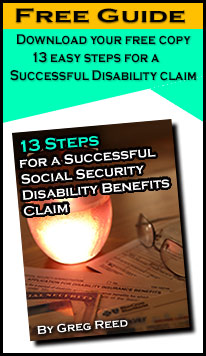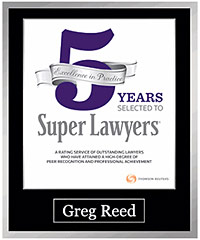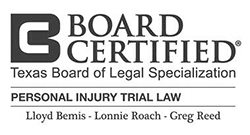Coronary dysfunction and qualifying for SS disability benefits
Social Security provides benefits for heart disease if the condition prevents you from working.
Author Attorney Lloyd Bemis:
Coronary dysfunction can refer to several different heart conditions. The heart is a vital organ and any aliment involving the heart should be treated with a sense of urgency and importance. Fortunately the SSA has a listing for heart issues (4.00 Cardiovascular System) in it’s Blue Book of conditions that qualify for disability benefits
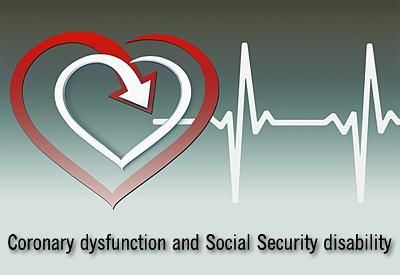
Coronary dysfunction refers to several different heart conditions. Social Security provides benefits for heart disease if the condition prevents you from working.
Unfortunately, heart problems can be difficult to diagnose correctly as there are many things that can go wrong with the heart, but they share common symptoms.
Chest pain, irregular or faster heartbeats, and a feeling of weakness can mean something is wrong with your heart. However, determining what exactly is causing the issue can require extensive testing.
The most common heart disease is Coronary Artery Disease (CAD), also known as ischemic heart disease.
This disease is the result of a process called arteriosclerosis, the thickening of the arteries. There are several potential causes of arteriosclerosis, but by far the most common is deposits of cholesterol and cellular waste inside the arteries.
The relationship between cholesterol and arteriosclerosis is not as straightforward as it may seem.
Cholesterol is needed for hormone production, tissue regeneration, and proper liver function. A high level of cholesterol in the body is not necessarily bad and may not necessarily lead to arteriosclerosis. In fact there are two types of cholesterol- low-density lipoprotein (LDL) and high-density lipoprotein (HDL). Experts have theorized that HDL actually helps clear LDL from the bloodstream, preventing arteriosclerosis.
Arteriosclerosis generally has no symptoms until it begins to affect organ function.
The most common symptom of arteriosclerosis is chest pain, also known as Angina. Pain from angina suggests that blood vessels are blocked and parts of the body are not getting the oxygen they need. Blockage from excess cholesterol may cause the heart to pump harder than necessary, which may in turn push fluids where they don’t belong or cause damage to the heart tissue due to stress.
Treatment for heart disease generally focuses on reducing the amount of cholesterol in the bloodstream.
Diet and exercise, smoking and alcohol use all contribute to heart disease. Generally, by the time symptoms have manifested, a healthy lifestyle will not be enough to offset the problem. Medications may work by dilating blood vessels to improve blood-flow, preventing or dissolving blood clots, or helping the heart work more efficiently.
If you have heart disease you may qualify for disability benefits. Contact the experienced Long Term Disability lawyers at 512-454-4000
The good news is that Social Security provides benefits for heart disease if the condition prevents you from working.
One of the most common symptoms of heart disease is chest pain triggered by stress; given that almost any type of work in any environment can be stressful, it is easy to see how heart disease can be disabling. Below are the prerequisites for qualifying for Social Security Disability Insurance with heart disease:
Chronic Heart Failure
Chronic Heart Failure can be objectively measured. Measurements of the left ventricle are taken and if it is thicker than it should be, Chronic Heart Failure is likely present. The Social Security Administration requires more than proof of the illness, it must affect your ability to work. The listing requires three or more episodes of acute failure requiring hospitalization, inability to work at 5 METs (equivalent to walking up a 10% grade at 1.7 mph), or symptoms so serious a physician refuses to allow an exercise test. If these conditions are met, the applicant will likely be eligible for disability.
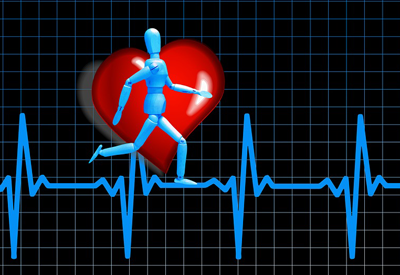
The Social Security Administration requires more than proof of the illness, it must affect your ability to work. Call 512-454-4000 for more information.
Ischemic Heart Disease
Ischemic Heart Disease, or Coronary Artery Disease, is measured by signs of stress under exercise testing. A finding of Ischemic Heart Disease may also be determined by frequent and serious ischemic episodes, or severe coronary artery disease.
Recurrent Arrhythmias
Uncontrolled episodes of cardiac syncope (loss of consciousness from low blood pressure) cause by abnormalities in heartbeat may meet the listing for Social Security benefits.
Symptomatic Congenital Heart Disease
Congenital Heart Disease is a birth defect in the heart. Generally this is a small hole or misshapen valves. The flaws in the heart structure result in bluing of the skin called cyanosis. Cyanosis is used by the Social Security Administration to determine the seriousness of the condition.
Heart Transplant
A person receiving a heart transplant is eligible for disability for a year following their surgery.
In order to qualify for Social Security Disability, you will need to satisfy a few specific requirements in two categories as determined by the Social Security Administration.
The first category is the Work Requirements which has two tests.
- The Duration of Work test. Whether you have worked long enough to be covered under SSDI.
- The Current Work Test. Whether you worked recently enough for the work to actually count toward coverage.
The second category is the Medical Eligibility Requirement.
- Are you working? Your disability must be “total”.
- Is your medical condition severe? Your disability must be “severe” enough to interfere with your ability to perform basic work-related activities, such as walking, sitting, and remembering.
- Is your medical condition on the List of Impairments? The SSA has a “List of Impairments” that automatically qualify as “severe” disabilities. If your disease is not listed this does not mean you cannot get disability, it means you must prove you cannot maintain employment due to your limitations.
- Can you do the work you did before? SSDI rules look at whether your medical condition prevents you from doing the work you did prior to developing the condition.
- Can you do any other type of work? If you cannot do your prior work, an evaluation is made as to whether you can perform any other kind of work.
More details can be found on our Qualifying for Disability page.
Contact the Long Term Disability lawyers at 512-454-4000 for a free consultation and see if you can get disability benefits for Heart Disease.
Even if your illness is not listed specifically, if it is severe enough to prevent you from working, you may be eligible to collect Social Security benefits.
Long Term Disability benefits may be available as well if you have Long Term Disability Insurance. Unfortunately, while Social Security Disability and Long Term Disability provide useful benefits for those who can’t work, it can be very difficult to actually obtain these benefits. Most initial applications are denied, and appealing a claim can be a confusing and difficult process.
If you have filed a claim for disability benefits and been denied, or if you are thinking about filing a claim, you should consider hiring an attorney. Having someone one your side who understands the process and has experience dealing with difficult insurance companies and government bureaucracy can be invaluable. The attorneys at Bemis, Roach and Reed have experience serving clients throughout central Texas including Austin, Dallas, and Houston. Call today for a free consultation.
Call 512-454-4000 and get help NOW.
Try these links for further reading on this subject:
Heart Disease: Find Out if You Qualify for Social Security Disability Insurance
Congestive Heart Failure and SSD
How much does an SSDI lawyer charge?

Your Free Initial Consultation
At Bemis, Roach and Reed, if we can't help you, we will try to find the right attorneys for you.
We offer each of our prospective clients a free no obligation one hour phone or office consultation to see if we can help you and if you are comfortable with us. We know how difficult a time like this can be and how hard the decisions are. If we can be of assistance to you and help you find a solution to your issue we will even if that means referring you to another attorney.
Or simply call
512-454-4000
to schedule your
Free Consultation
Let's get you Started:
If you could provide us with some basic information about your claim we will get right back with you with a free case evaluation and schedule your Free Consultation Today.


